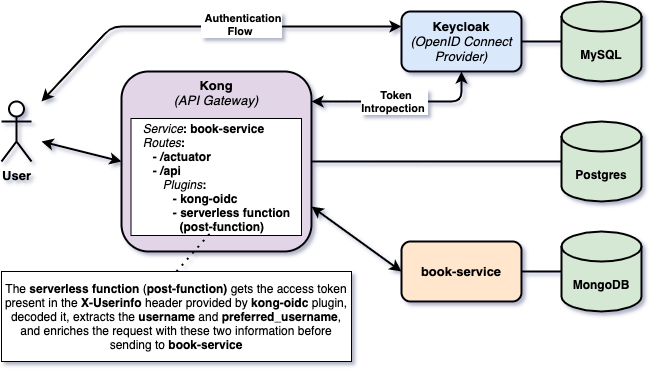The goal is to create a Spring Boot application to manage books, called book-service and secure it by using Kong API gateway and Keycloak OpenID Connect Provider.
Note: In
kubernetes-minikube-environmentrepository, it's shown how to deploy this project inKubernetes(Minikube)
As we can see from the diagram, book-service will only be reachable through Kong API gateway.
In Kong, it's installed kong-oidc plugin that will enable the communication between Kong and Keycloak OpenID Connect Provider.
This way, when Kong receives a request to book-service, it will validate together with Keycloak whether it's a valid request.
Also, before redirecting to the request to the upstream service, a Serverless Function (post-function) will get the access token present in the X-Userinfo header provided by kong-oidc plugin, decoded it, extracts the username and preferred_username, and enriches the request with these two information before sending to book-service
-
Spring BootREST API application to manages books. The API doesn't have any security.book-serviceusesMongoDBas storage.Endpoints
GET /actuator/health GET /api/books POST /api/books {"isbn": "...", "title": "..."} GET /api/books/{isbn} DELETE /api/books/{isbn}
-
Open a terminal and navigate to
springboot-kong-keycloakroot folder -
Run the command below to start
mongodbDocker containerdocker run -d --name mongodb -p 27017:27017 mongo:5.0.5 -
Run the command below to start
book-service./mvnw clean spring-boot:run --projects book-service -
Open another terminal and call application endpoints
curl -i http://localhost:9080/api/books curl -i -X POST http://localhost:9080/api/books -H "Content-Type: application/json" \ -d '{"isbn": "123", "title": "Kong & Keycloak"}' curl -i http://localhost:9080/api/books/123 curl -i -X DELETE http://localhost:9080/api/books/123 curl -i http://localhost:9080/actuator/health -
To stop
book-service, go to the terminal where it's running and pressCtrl+CmongodbDocker container, go to a terminal and run the following commanddocker rm -fv mongodb
-
In a terminal, make sure you are in
springboot-kong-keycloakroot folder -
Build Docker Image
./docker-build.shEnvironment Variable Description MONGODB_HOSTSpecify host of the Mongodatabase to use (defaultlocalhost)MONGODB_PORTSpecify port of the Mongodatabase to use (default27017)
-
In a terminal, create a Docker network
docker network create springboot-kong-keycloak-net -
Run the command below to start
mongodbDocker containerdocker run -d --name mongodb -p 27017:27017 --network springboot-kong-keycloak-net mongo:5.0.5 -
Run the following command to start
book-serviceDocker containerdocker run --rm -p 9080:9080 --name book-service -e MONGODB_HOST=mongodb --network springboot-kong-keycloak-net ivanfranchin/book-service:1.0.0 -
Open another terminal and call application endpoints
curl -i http://localhost:9080/api/books curl -i -X POST http://localhost:9080/api/books -H "Content-Type: application/json" \ -d '{"isbn": "123", "title": "Kong & Keycloak"}' curl -i http://localhost:9080/api/books/123 curl -i -X DELETE http://localhost:9080/api/books/123 curl -i http://localhost:9080/actuator/health -
To stop
book-service, go to the terminal where it's running and pressCtrl+CmongodbDocker container, go to a terminal and run the following commanddocker rm -fv mongodb- remove Docker network
docker network rm springboot-kong-keycloak-net
-
In a terminal, make use you are in
springboot-kong-keycloakroot folder -
Run the command below
docker build -t kong:2.7.0-centos-oidc docker/kong
-
In a terminal, make use you are in
springboot-kong-keycloakroot folder -
Run the following script
./start-docker-containers.sh -
Wait for Docker containers to be up and running. To check it, run
docker ps -a
Note:
book-serviceapplication is running as a Docker container. The container does not expose any port to HOST machine. So, it cannot be accessed directly, forcing the caller to useKongas gateway server in order to access it.
-
Open a new terminal and make sure you are in
springboot-kong-keycloakroot folder -
Run the following script to configure
Keycloakforbook-serviceapplication./init-keycloak.shThis script creates:
company-servicesrealm;book-serviceclient;- user with username
ivan.franchinand password123.
-
The
book-serviceclient secret (BOOK_SERVICE_CLIENT_SECRET) is shown at the end of the execution. It will be used in the next step -
You can check the configuration in
Keycloakby accessing http://localhost:8080. The credentials areadmin/admin.
-
In a terminal, make sure you are in
springboot-kong-keycloakroot folder -
Create an environment variable that contains the
Client Secretgenerated byKeycloaktobook-serviceat Configure Keycloak stepBOOK_SERVICE_CLIENT_SECRET=... -
Run the following script to configure
Kongforbook-serviceapplication./init-kong.sh $BOOK_SERVICE_CLIENT_SECRETThis script creates:
- service to
book-service; - route to
/actuatorpath; - route to
/apipath; - add
kong-oidcplugin to route of/apipath. It will authenticate users againstKeycloakOpenID Connect Provider; - add
serverless function (post-function)plugin to route of/apipath. It gets the access token present in theX-Userinfoheader provided bykong-oidcplugin, decoded it, extracts theusernameandpreferred_username, and enriches the request with these two information before sending tobook-service.
- service to
-
Try to call the public
GET /actuator/healthendpointcurl -i http://localhost:8000/actuator/health -H 'Host: book-service'It should return
HTTP/1.1 200 {"status":"UP"} -
Try to call the private
GET /api/booksendpoint without access tokencurl -i http://localhost:8000/api/books -H 'Host: book-service'It should return
HTTP/1.1 401 Unauthorized no Authorization header found -
Get
ivan.franchinaccess tokenACCESS_TOKEN=$(./get-access-token.sh $BOOK_SERVICE_CLIENT_SECRET) && echo $ACCESS_TOKEN -
Call again the private
GET /api/booksendpoint using the access tokencurl -i http://localhost:8000/api/books -H 'Host: book-service' \ -H "Authorization: Bearer $ACCESS_TOKEN"It should return
HTTP/1.1 200 [] -
You can try other endpoints using access token
Create book
curl -i -X POST http://localhost:8000/api/books -H 'Host: book-service' \ -H "Authorization: Bearer $ACCESS_TOKEN" \ -H "Content-Type: application/json" -d '{"isbn": "123", "title": "Kong & Keycloak"}'Get book
curl -i http://localhost:8000/api/books/123 -H 'Host: book-service' \ -H "Authorization: Bearer $ACCESS_TOKEN"Delete book
curl -i -X DELETE http://localhost:8000/api/books/123 -H 'Host: book-service' \ -H "Authorization: Bearer $ACCESS_TOKEN"
-
MongoDB
List books
docker exec -it mongodb mongo bookdb db.books.find()Type
exitto get out of MongoDB shell -
jwt.io
With jwt.io you can inform the JWT token received from
Keycloakand the online tool decodes the token, showing its header and payload.
Go to the terminal where you run the script start-docker-containers.sh and press q to stop and remove all containers
To remove the Docker image created by this project, go to a terminal and, inside springboot-kong-keycloak root folder, run the script below
./remove-docker-images.sh
